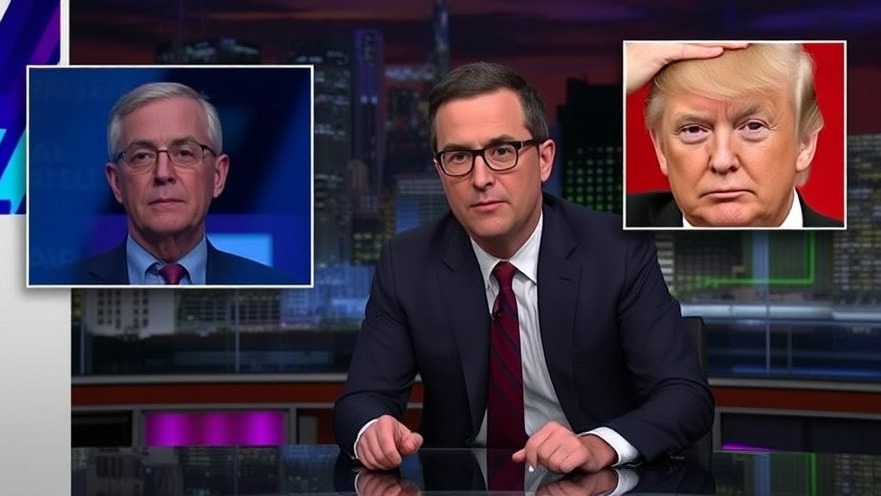
The Unraveling of International Relations Amidst Economic Chaos
In an episode that blended humor with serious commentary, John Oliver, host of Last Week Tonight, articulated a critical viewpoint on the U.S. economy's erratic state under President Trump's tariff strategies. Oliver captured the chaos of the past week, likening the precarious decisions made regarding tariffs to an 'emotional rollercoaster' that not only impacts investors but fundamentally affects global trust in American economic stability. He emphasized that the turmoil isn't just a temporary blip but indicative of deeper, systemic issues within the U.S.'s trading ethos.
Historical Context: Tariffs through the Ages
The concept of tariffs is not new; they have been employed for centuries as a means of regulating international trade. Their effectiveness, however, has often been debated. Historically, tariffs have played a dual role—protecting domestic industries while also provoking retaliation from trade partners. This tit-for-tat nature often escalates to broader trade wars, reminiscent of the Smoot-Hawley Tariff Act of 1930, which deepened the Great Depression. Oliver’s critique underscores a perilous precedent where the trust in America's trade strategy is at risk, reminiscent of historical missteps that led to economic downturns.
Humor Heals: The Role of Satire in Political Commentary
Oliver's comedic approach serves as a potent tool in political discourse, enabling audiences to digest complicated subjects like tariffs in a more palatable way. His vivid imagery—comparing Trump's handling of tariffs to a 'monkey with a gun'—while humorous, provides sharp insight into the unpredictable nature of current policies. This method of engaging with serious economic issues generates a dialogue that can foster better understanding, particularly among the younger demographics, including digital nomads who navigate diverse economic landscapes.
The Ripple Effects: What Tariffs Mean for Consumers
Tariffs fundamentally alter price dynamics, often resulting in higher costs for consumers. As Oliver pointed out, Trump's blanket tariffs, including 10% on various imports and an astonishing 145% on Chinese goods, may lead businesses to reconsider their domestic operations. Many consumers might believe they're supporting local products, but the reality is that significant portions of everyday goods, from electronics to clothing, rely on international supply chains. Understanding the economic implications of these tariffs helps consumers make informed decisions in their everyday purchases.
Global Perspective: How the World Views America Amidst Tariffs
The global economic landscape is a tapestry of interconnected trade relationships, and America’s recent actions have sent shockwaves through international markets. Oliver’s commentary indicates that trust in American policy is dwindling, a sentiment echoed among foreign leaders. Countries that once viewed the U.S. as a stable trading partner are now reevaluating their positions, potentially leading to a realignment of alliances. This shift may yield significant consequences not only for U.S. businesses but for global trade as economies adjust to a new landscape.
Digital Nomads and Tariffs: A New Age of Economic Sensitivity
For digital nomads, the implications of these tariffs extend beyond economics; they highlight the importance of being aware of the environments in which they operate. With a lifestyle that spans across borders, understanding the nuances of local economies, trade policies, and consumer pricing becomes indispensable. As Oliver showcased, the chaos of tariffs isn’t just an abstract concept; it’s a reality that may affect their travel budgets, work opportunities, and overall economic engagement across borders.
Looking Ahead: What’s Next for U.S. Trade?
Oliver concludes with an urgent warning: the chaos surrounding tariffs signifies a potential pivot point for U.S. trade policy. The lasting repercussions he predicts could redefine how international commerce operates. If Trump's administration remains steadfast in its approach, we might see a shift where American companies relocate abroad to avoid tariffs, ultimately eroding the very jobs tariffs aimed to protect. Evaluating this as a digital nomad or an engaged citizen offers a chance to consider not just personal impacts, but the larger narrative of economic globalization.
The conversation doesn’t stop here. It’s crucial to reflect on how these economic policies resonate beyond the immediate effects on prices or job markets; they touch on themes of trust, international collaboration, and the ethical responsibilities we hold as consumers in our interconnected world. By staying informed, we can engage more thoughtfully with the socio-economic dynamics shaping our lives and the lives of others.
 Add Row
Add Row  Add
Add 




Write A Comment